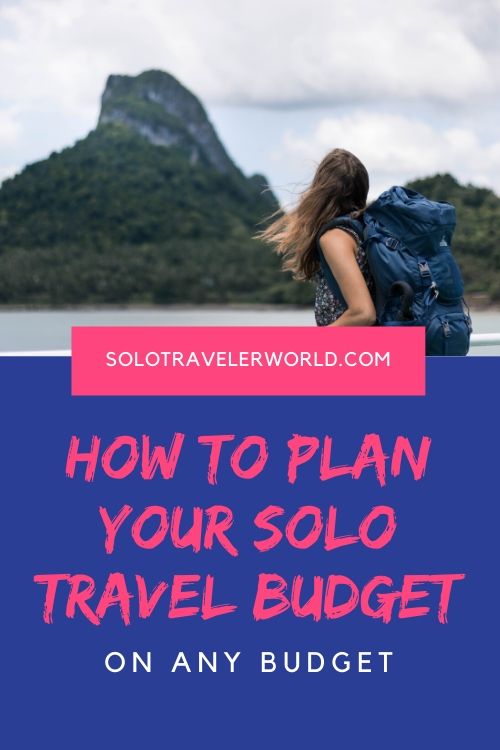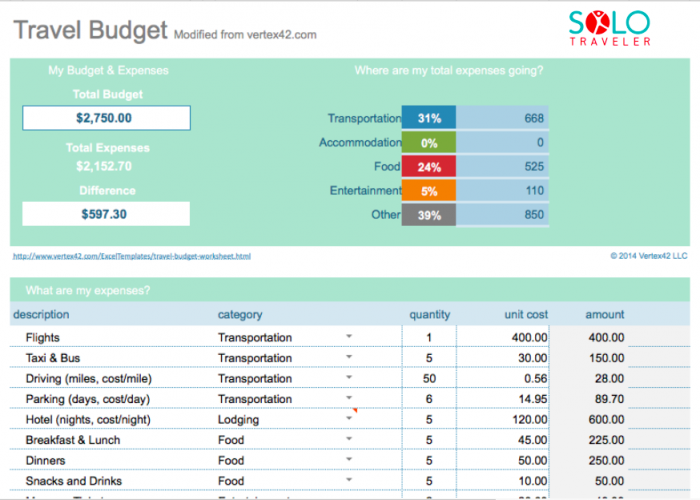
Creating your solo travel budget is an important part of any trip planning process. In fact, it's the first step.
While I'd rather not be constrained by money, I'd also prefer to travel and return home without debt and future trips delayed. A realistic travel budget makes this possible.
I feel pretty capable of planning travel on just about any budget. I've traveled frugally and luxuriously. It just takes some research and thought to do it right so that you get the most out of your trip.
Now, for my travel budgeting process that you can apply to your own upcoming trips.

Two Ways to Travel Budget
There are two basic approaches to planning and budgeting travel. One focuses on realizing specific travel dreams. The other makes travel fit the finances available.
1. How to Travel Budget for a Luxury Trip
If the where and how of your trip is really important to you (if the destination and your travel style–whether it's luxury, eating at special restaurants, taking classes, or relaxing at a resort–are not flexible), then your planning starts with how much money the trip will actually cost. Start by calculating the cost of the trip using the guidelines in the next section. If the cost exceeds your budget:
- Shift your dates to the shoulder or off-season and see whether that improves matters. Read How to Save on Shoulder Season Travel.
- If date-shifting is not possible or doesn't make enough of a difference, then you may have to wait and travel later so that you can save the money for the trip. Read How to Save Money for Travel for a solid how-to approach on saving cash for travel.
2. How to Plan Your Travel Budget with Limited Funds
If the fact that you're traveling is more important than where and how you travel, then your planning is based on the money you actually have. You may need to choose less expensive destinations or book more affordable accommodation. Determine how much money you have to spend and use the tips below.
- Best Budget Destinations for Solo Travelers
- How to Make Solo Travel Affordable, Cheap and Even Free
- Your Solo Travel Budget: It’s All About Balance
How to Budget Your Trip
To calculate the cost of your trip, begin with the big expenses and work down to the smaller ones. The biggest costs are always transportation or accommodation, depending on where you're going. If you're taking a flight (or flights), this may be your biggest expense. But if you're taking a short flight to an expensive city, accommodation may be your big ticket item. Determine which is likely to be your biggest expense and calculate what the cost will be.

1. Download our free travel budget spreadsheet.
Click here to download our free travel budget spreadsheet. There are numbers already entered into the spreadsheet to show you how it works. To begin, enter your budget for the trip. As you fill in your information for each travel expense, the financial summary at the top will tell you whether you are over or under budget. This allows you to play and decide where you want to save and where you want to splurge and still stay within budget.
2. Determine your transportation costs.
You need to consider the cost to get you to your destination and the cost of transportation on the ground. I use Rome2Rio.com to help my determine approximate costs of ground transportation. For flights, I use Flightnetwork.com. The cost of flights, bus, train, transfers, taxis, transit and car rentals, including gas and insurance must be considered.
3. Set your accommodation budget.
Determine your average nightly rate and multiply it by the number of nights you'll be there. You can read how I came in at an average nightly rate of $73.39 in Kauai even though I spent a couple of nights at a luxury resort in Budget Accommodation in Kauai: Four Ways to Stay. Also read: How to Save Money on Hotels and Other Travel Accommodation.
4. Consider your culinary desires.
Food is an expense that can vary widely. If going to the restaurants of celebrity chefs is your thing, plan for it. It will be expensive and you'll likely have to book long in advance. If you're happy cooking for yourself or eating street food, your food budget will be far less. With food it's easy to accommodate your travel budget, simply save sometimes (have a picnic of food from the grocery store) and splurge at other times (enjoy a special restaurant).
5. Factor in entertainment and activities.
Whether it's a kayaking day trip or attending a Broadway play, it's rare to go somewhere and not incur additional expenses for entertainment of some form. It's important to budget for these. Also note that it may be less expensive to purchase tickets before you go. Check out our posts on free and low-cost tips for many expensive destinations like London, Paris, Sydney, and New York.
6. Plan for walking-around money.
You may need money for things like transit, a snack, or sun block. There are dozens of small things you'll likely buy over the course of your trip. Set a daily contingency fund in your travel budget for those little extras along the way.
7. Don't skimp on travel insurance.
I believe this to be an absolute necessity. Here are the the things you need to know to ensure you get the right coverage for your needs, along with our recommended providers: A Complete Guide to Travel Insurance for Solo Travelers. If you're a senior, read Best Travel Insurance for Senior Solo Travelers.
8. Allot money for souvenirs.
This is not a line in my travel budget because shopping isn't my thing. But if it's yours, make sure you've calculated it as part of your budget. If you're shopping in a currency other than your own, read: Your Currency or Theirs? The Decision Makes a Difference.
9. Figure in some “breaking the budget” money.
Travel should be fun and it's no fun being on a tight financial leash. The amount of your “break the budget” money will depend on how long you're traveling and your overall budget. I like to have at least 15% of my overall travel budget available for spontaneous purchases.

Travel Budget, Money and Meaning
Travel budgeting inevitably means money choices and trade-offs.
As a solo traveler, you choose the trade-offs you want to make.
Take a moment to reflect. Stress can be the trade-off to consider when making money decisions. You may want to stay at a five-star rather than a four-star resort but that extra expense may cause you financial stress. You may want an amazing bike for your cycling trip but the fear of it being stolen may cause you unnecessary stress.
Rather than breaking the budget, consider shifting where you spend your budget. Some people will eat on the cheap in Italy to have the money to spend on a fabulous pair of Italian shoes. Others will stay at a hostel so they can afford to eat at a Michelin Star restaurant.
Good money decisions are about being aware of your financial constraints, stress, passions, and the trade-offs you're willing to make.
According to happiness theory, when money is spent on travel, happiness grows over time. However, when money is spent on things, happiness tends to diminish over time.
So, yes, buy travel with your money. Plan and budget your trips according to what you can afford.

